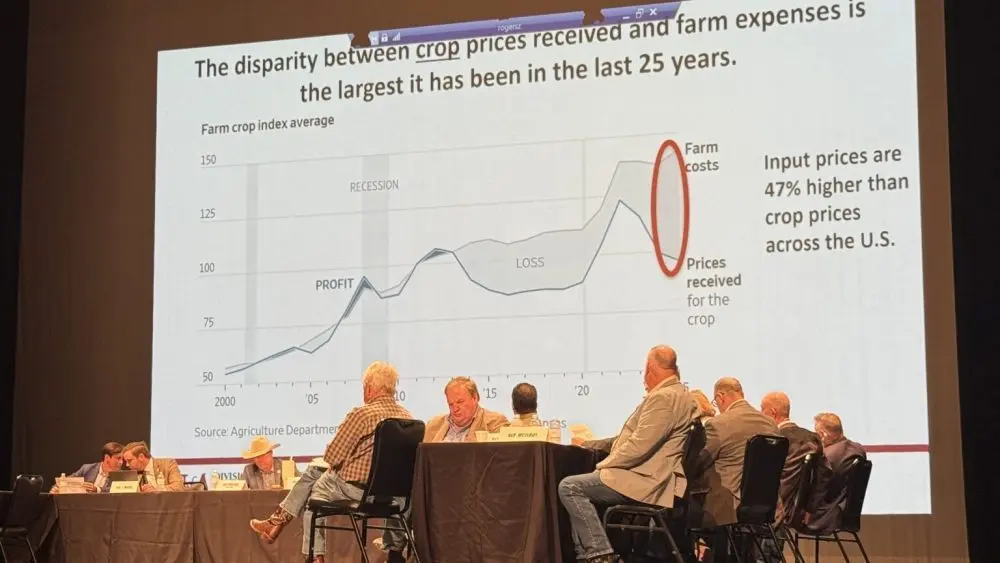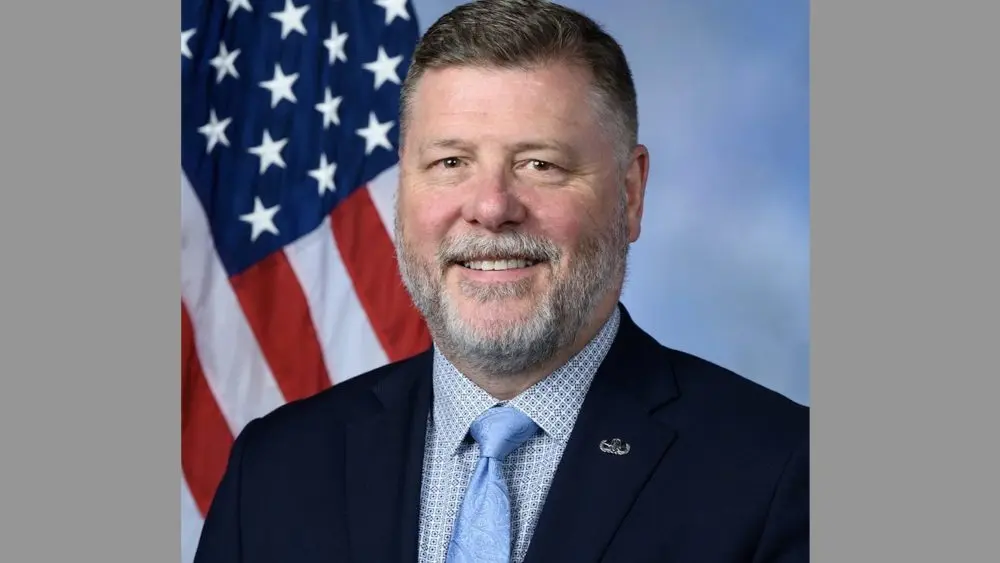Arkansas legislators listen to a presentation on farming economics from the University of Arkansas’ Cooperative Extension Service in Stuttgart on Sept. 23, 2025. (Photo by Ainsley Platt/Arkansas Advocate)
Farmers are reaching a breaking point, legislators told
By Ainsley Platt, Arkansas Advocate
STUTTGART — Arkansas agriculture industry leaders warned again Tuesday of a need for aid to mitigate a crisis that has reached a breaking point for family farmers.
“If something is not done very quickly and substantially, I’m afraid people are going to go ahead and make decisions that they can’t change back,” Kirk Vansandt, the chief agriculture lending officer for Farmers and Merchants Bank, told a legislative panel in Stuttgart.
Tuesday’s hearing before the House Agriculture, Forestry and Natural Resources subcommittee was the latest in a string of high-profile public meetings where members of the state’s agriculture community have exhorted Arkansas’ congressional delegation and President Donald Trump to come to the aid of commodity crop farmers, who are facing one of their worst periods in decades as a result of skyrocketing production costs and stagnant demand.
Without aid, many in the industry believe 25-40% of farmers will decide to bow out after this season, Vansandt told the panel. Arkansas led Southern states in the number of Chapter 12 farm bankruptcies in 2024, according to a presentation shown to the subcommittee — and it’s already far surpassed its 2024 Chapter 12 totals in 2025.
“Personally, I think it’s one out of three people if nothing happens. It’s that dire,” Vansandt said.
Vansandt said his impression after a recent trip to the nation’s capital was that aid will come — but he worries it might not be soon enough.
A provision of the One Big, Beautiful Bill Act that passed earlier this year provided some assistance for farmers, but that aid isn’t set to hit bank accounts until fall of next year. Those addressing the subcommittee almost universally said that wouldn’t be soon enough to avert mass closures of farms.
“We’re in such a dire strait with our export markets,” Vansandt said. “It’s going to take a bridge to get us all from right now to the fall of ’26.”
The industry representatives stressed that it wouldn’t only be farmers who suffered if farms began to close en masse — so would the small rural communities they support, many of which have already lost large numbers of their populations in recent years. The businesses that support farms, like agricultural aviators, farm banks and parts stores, would also take a hit, they said.
Rep. Stephen Meeks, R-Greenbriar, asked what, if anything, the industry spokespersons wanted to see the state do to help.
“My concern is, if it’s just a money issue, for every dollar that we give y’all to help you weather the storm, that’s $1 we’re taking from another Arkansas family … that’s also struggling to put food on the table,” Meeks said. “We can’t print money like the federal government.”
Ross Wood, the retail operations manager for Stratton Seed, said help with taxes on capital expenditures or fuel would help.
“Taxes on parts and maintenance — that kills us,” Wood said. “Any help would help.”
Numerous people said they didn’t want handouts, but that they had become necessary in the face of a market that was not profitable. Vansandt put it bluntly: “That’s just not the world we’re living in right now.”
“Subsidies are going to be the only thing that can make up the difference,” he said.
The toll is not just financial. One farmer who was asked to speak, Sydney Robinett, said the stress of managing the downturn is the kind that doesn’t go away at the end of the work day.
“It gets in bed with you,” he said. “Sometimes it’s better to be awake than it is to sleep at night, because when I’m awake, I can think of what’s going on today. The bad dreams happen at night. The bad dreams are going out of business. The bad dreams are the uncertainty.”
Subcommittee Co-Chair Rep. DeAnn Vaught, R-Horatio, became emotional as she concluded the meeting. Noting her own job as a farmer, she said her heart broke for those struggling in the current commodity market.
“I’ve been saying for several weeks: February next year is way too late for us to forecast what this is going to do for our state,” Vaught said. “[By] November, we will have farms that have already made the decision to shut down, and they will never be able to go back into production again.”
The Arkansas Advocate is a nonprofit, nonpartisan news organization dedicated to tough, fair daily reporting and investigative journalism that holds public officials accountable and focuses on the relationship between the lives of Arkansans and public policy.
Have a news tip or event to promote? Email White River Now at news@whiterivernow.com. Be sure to like and follow us on Facebook and Twitter. And don’t forget to download the White River Now mobile app from the Google Play Store or the Apple App Store.
Get up-to-date local and regional news/weather from the First Community Bank Newsroom on Arkansas 103.3 KWOZ every weekday morning and afternoon. White River Now updates are also aired on weekday mornings on
93 KZLE, Outlaw 106.5, and Your FM 99.5. Catch CBS News around the top of every hour on 1340 KBTA.







